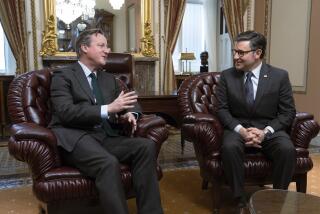Heed Priorities, Blair to Tell Bush
- Share via
CRAWFORD, Texas — On the world stage, British Prime Minister Tony Blair stands without rival as President Bush’s head cheerleader--to such an extent that critics deride him as “America’s poodle.” But Blair arrives here today for a weekend of consultations with Bush as a counselor with some tough advice to dispense.
His message: Forget about Iraq until the Middle East crisis and the war on terrorism in Afghanistan abate. Even then, Blair is known to harbor doubts about the consequences of a campaign to oust Iraqi President Saddam Hussein.
The talks between “George” and “Tony,” as they call each other, should be cordial, reflecting a mutual affinity and their many shared goals and preferences.
But Bush and Blair face no shortage of difficult subjects, aside from the Middle East and Afghanistan. They include a further expansion of the North Atlantic Treaty Organization and a trade dispute with Europe resulting from Bush’s recent imposition of tariffs on steel imports.
“I think you’re going to see a very wide-ranging series of discussions,” White House Press Secretary Ari Fleischer said at a news briefing Wednesday.
“The United States and Great Britain enjoy a very special relationship. . . . And the two leaders enjoy spending time together and talking about these various topics,” he said.
On the Middle East, they agree on a common framework of action: the implementation of a cease-fire plan devised by CIA Director George J. Tenet, followed by negotiations on a final political settlement as outlined by former Sen. George J. Mitchell (D-Maine).
But notwithstanding Bush’s announcement Thursday that he is dispatching Secretary of State Colin L. Powell to the Middle East, Blair may propose a British or European role in the search for peace in the region.
A Blair spokesman in London said the prime minister believes that his experience with the Northern Ireland peace efforts could help exert pressure on Palestinians and Israelis, who are locked in an unforgiving cycle of violence.
“The main issue is going to be the Middle East--the prime minister is appalled by what is going on here. The situation is the most explosive it has been for years,” said the spokesman, who asked not to be identified. “We want to help the U.S. play this role” of peacemaker.
Though Europeans have overwhelmingly backed the U.S. and British efforts against terrorists in Afghanistan, they are much less supportive of any military action to oust Hussein. So the degree of Blair’s support for such an effort will be carefully gauged.
Before Blair left for Texas, his government had intended to announce details of Hussein’s efforts to develop biological, chemical and nuclear weapons, to lay the groundwork for a possible attack on Iraq. Instead, the British held back.
It was unclear whether that decision related to political opposition to a military strike or a lack of convincing evidence against Hussein.
Until the Israeli-Palestinian crisis exploded, charting the next step against Hussein’s regime was to have been the main focus of the Crawford talks. London is as concerned as Washington about evidence that Baghdad is clandestinely developing weapons of mass destruction. But, like many in Europe and the Middle East, Britain is particularly concerned about the aftermath of any operation to eliminate Hussein.
Moreover, Blair strongly believes that the crises in the Middle East and Afghanistan must be dealt with before the West takes on another hot spot, and that could take a year, British officials said.
On Afghanistan, London is concerned that the U.S. focus on routing Al Qaeda fighters and tracking their leaders has slowed progress on creating a viable Afghan military, which is vital to consolidating central rule over the country and restoring law and order.
Britain wants to see faster training of an Afghan army. And it would like to turn over control of the peacekeeping force in Kabul, the Afghan capital, to Turkey.
Other issues on the agenda include the evolving relationship between NATO and Russia, and the steel quota issue. Blair had appealed to the White House not to impose new tariffs on imported steel and is said to feel somewhat burned by Bush’s decision to do so.
Blair is to arrive at Bush’s ranch this afternoon. On Saturday, he and Bush are scheduled to hold a news conference. Blair returns home Sunday, arriving in time for next week’s funeral for Queen Mother Elizabeth. First Lady Laura Bush is leading the U.S. delegation to that service.
*
Chen reported from Crawford and Washington and Wright from Washington. Janet Stobart of The Times’ London Bureau contributed to this report.
More to Read
Sign up for Essential California
The most important California stories and recommendations in your inbox every morning.
You may occasionally receive promotional content from the Los Angeles Times.













